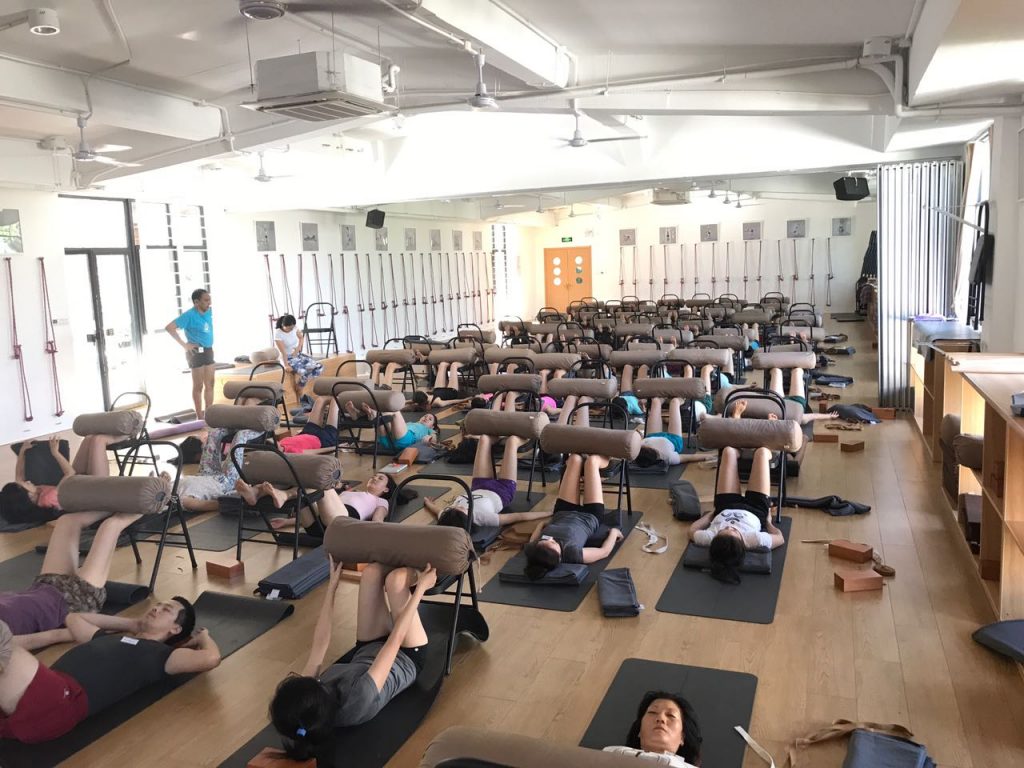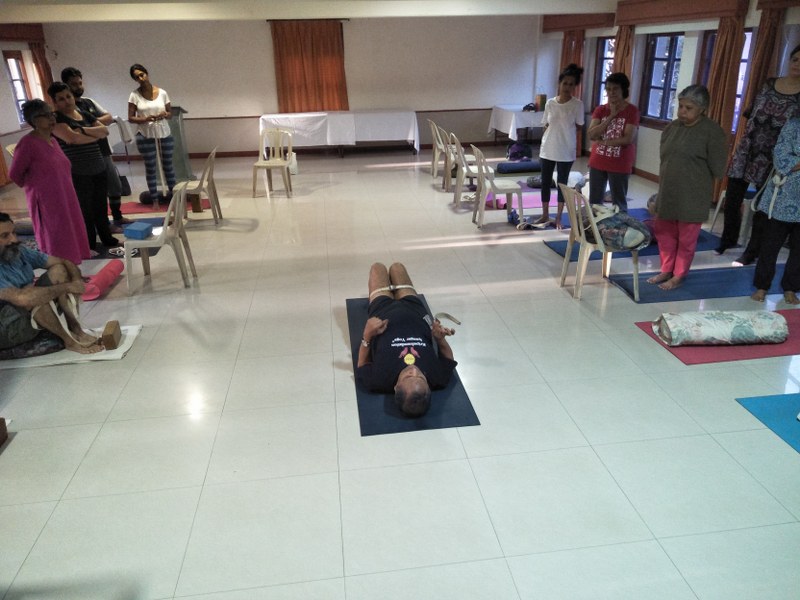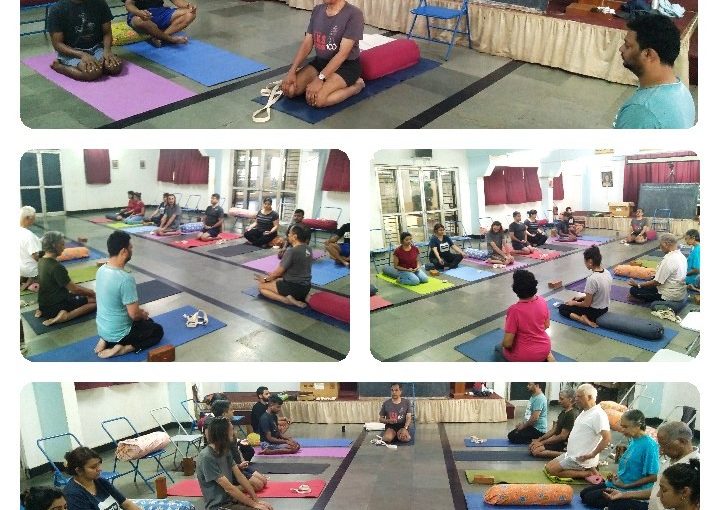WORKSHOPS: Yoga workshops at the Kripa Foundation centre are popular and give participants excellent grounding in the practice of Yoga. People travel far to participate in these workshops, staying in the no-frills accomodation provided at the centre
BY MINAL SANCHETI
Substance abuse with drugs and alcohol is a huge problem amongst youth today and Fr Joe Pereira’s Kripa Foundation is doing some exemplary and praiseworthy work to rehabilitate addicts seeking positive reasons to overcome their killer addictions…
ADDICTION is a primary disease,” says Father Joseph Pereira, founder of the Kripa Foundation, one of the oldest NGOs of India working with HIV patients and those suffering from substance and alcohol addiction. Fr Joe Pereira won the prestigious Padmashree for social work and a lifetime award from the president of India in 2014.
“To be human is to have an Achilles heel. So we are born with certain disability. How we handle that makes all the difference” he said.
Some people are more vulnerable to addiction than others. “They may have a family history of addiction. They may have the temperament that makes them more vulnerable to addiction, like impulsivity or other childhood problems. There are a lot of neurochemical changes that occur once there is regular usage. So people who are prone to addiction don’t get the same effect that doses of drug would give another ‘normal’ person. So they have to increase their doses and when they stop taking the drugs they get drug-using symptoms,” says Dr Pratima Murthy, Professor, Department of Psychiatry & Chief of De-addiction Services, National Institute of Mental Health & Neuro Sciences, Bangalore.
People suffering from addiction are misunderstood by society. They are always looked down upon.
“People in society don’t understand addiction. Even I didn’t until I attended Narcotics Anonymous meetings. People think it’s some kind of moral deficiency. It took me many years to understand that it’s a disease and finally there is a breakthrough to understand my problems,” said Neha (name changed) who was an addict for 15 years. She is now recovering from substance addiction.
Abstinence from drugs is an important step in self-recovery from drug addiction. Fr. Joseph Periera firmly believes in treatments that support abstinence from intoxicants, “There are many responses to drug addiction, so I would rather hold on to any method that encourages abstinence because people suffering from addiction don’t want to stop.”
Abstinence from intoxicants helps to come out of the addiction but to tackle depression and other co-occurring mental health problems the patient may require medications, said Dr Murthy, “Complete abstinence improves the condition of the patients. But if the patients have additional problems like depression, they may often need to be treated.”
Fr Joseph Periera has been working in the field of drug and alcohol addiction for 38 years and has travelled to more than 40 countries. He has also given insights to people who practice meditation. “If you don’t keep up with the benchmark you can relapse the next day. As soon as you walk next to the place you used to do drugs, you will fall for it again. It’s a very delicate matter. You cannot fool around with this disease. It’s too powerful. In alcoholism, they say it’s cunning, powerful and baffling.”

RAJESH
A person suffering from addiction will find reasons for taking drugs.
“No reason is good enough for intoxication,” said Rajesh (name changed) who fought his addiction to intoxicants and has been clean for 22 years now. He further said, “Even though we avoid drugs, we still have struggles like financial and other problems. Just because we have problems, doesn’t mean we should use the substance. Before joining the rehab we just looked for reasons to intoxicate. But because of the rehab and things we learned here, we understand why and how we should stop the addiction. No matter how big the problems are, now we have learned to face it and not run away. Running away from problems means going back to addiction. If we have ten problems, by taking drugs or intoxicants we cannot make our problems come down to nine. Instead, the problems only add on. I can try to bring down my problems by avoiding drugs.”
Festivals are no reason for getting intoxicated. Rajesh said, “There are many reasons why an individual would want to be intoxicated. Any festival like Diwali, Holi, Eid or the New Year’s Eve celebration can be a reason for getting intoxicated. These festivals are to celebrate our culture. We understand this but those who are suffering from addiction don’t. I learned at the rehab how we should stay away from intoxicants and help others to do the same. I helped admit many addicts to hospitals and rehabs and counselled them.” He is currently working at Kripa Foundation as a peer counsellor.
A better way of understanding an addict’s relationship with intoxicants is by understanding the philosophy of I-it relation. Father Joseph Periera calls drug addiction as ‘I-it’ relation. He explains, “Addiction is an ‘I-It’ relationship. As great existentialist Martin Buber said, “We are born for love and love is I-thou relationship. If I don’t get that I switch over to ‘I-It’ relationship. ‘It’ can be anything like drug of my choice, alcohol, sex, gambling, misuse of money and all that. Sometimes people turn around when they get their love.
“You have to catch the snake by the neck. If you catch the snake by the stomach and the tail, you can get bitten all the time. You have to put your finger on the right causative factor. I don’t say it has caused you, I say it has occasioned you. It’s not a cause, it’s an occasion. Somebody has abused him or her as a child. She or he wants to kill that pain. She or he takes refuge into sex, alcohol and drugs. That’s what we have to get behind.”
Rajesh, who has maintained his sobriety for more than two decades, had started intoxicating from the age of 15. “Even my father was a drug-dependent for 15 years. After his death, I became a drug-dependent too. I took all kinds of intoxicants such as brown sugar, other kinds of drugs and alcohol. Due to addiction, I experienced many problems and became homeless. I used to sleep on the roads. Somehow I would arrange money for drugs. I had stooped so low that I could have done anything for drugs.”
His journey on the path of recovery started when he went for a detoxification program. He joined Kripa Foundation as a patient suffering from addiction and after successfully recovering he now guides others going through addiction.
“We want to avoid drugs but that doesn’t happen. Then I learned how to avoid substances and how can we save ourselves from addiction. Now I am clean for 22 years and I am doing a job at Kripa foundation. We help others who are going through the same struggle. We can work anywhere but this work gives us more satisfaction than any other work. That’s because we can understand them, others can’t.”

According to Mental Health America, peer supporters are people who use their experience of recovery from mental health disorders to support others in recovery. Combined with skills often learned in formal training, their experience and institutional knowledge put them in a unique position to offer support. They go by many names like peer support specialist or recovery coach.
Rajesh now works as a sponsor and peer counsellor, “A peer counsellor is better than other counsellors because he can understand him better.”
Addiction is considered a stigma in society. Rajesh talks about how society views addiction, “People have a wrong mentality about the addicts. They think they cannot recover. Society often heckles them, calling them all sorts of things. They should understand and give them a second chance to improve. But it’s important to know how to give them one more chance. The person who is suffering from addiction should be given proper guidelines and shown the right way to come out of it. They need to understand how the rehabilitation program works. The society considers them unfit for any kind of job and mistreats them. Most people have this kind of thinking, even today. So nobody comes forward to help people suffering from addiction.”
The American Medical Association and the American Society of Addiction Medicine among other associations define addiction as a disease.
NANDANA
NANDANA (name changed), now clean for 23 years, was an alcohol dependent. She said, “My husband was unable to find a solution to my addiction to alcohol. Then he came to know about Kripa Foundation from a colleague. After he understood the disease and why I was behaving in a certain way he became a bit cooperative.”
After having an abusive relationship with spouse and other family problems, Nandana started depending on alcohol for a solution, “My journey of addiction started way back in 1991. I was born in a very conservative and orthodox family. My marriage was not up to my expectations and there were a lot of adjustments and compromises that had to be made which I was not very comfortable with. At the time I used to drink once in a while at parties. When I was facing the problems I started drinking once or twice in the afternoon. Soon my alcohol addiction went on increasing. It didn’t solve any issue.”
“During that time, around 22-23 years back, there was a lot of social stigmas. There was not much awareness. The female alcoholic was always looked down upon. My husband used to verbally abuse me and I had no one to share my problems with. So my problems increased,” she said.
During her time facing the hardships of life, Nandana had no one to share her problems with, “I had a love marriage so I had nobody to call back on or share my problems with.”
A homemaker, Nandana could never become financially independent, which made her worse. “I was never a working woman, I was always a homemaker. I had no independence at all, financially or otherwise. I was always dependent on one person or the other. That was one more part that was affecting me very badly.”
Drinking affected her relationships. “Though I have never gone to a bar to drink, I always used to buy alcohol and drink at home. When my family came to know about this everyone was obviously very upset. My marriage was on the rocks. Although my husband supported me, he didn’t stop abusing.”
In society, the stigma of addiction is higher in women than in men.
“I don’t call anyone a patient; for me everyone’s a victim, including you and me. Something must have triggered you to get into, let’s say, this company,” says Roshan Mansukhani, a music therapist based in Mumbai. He uses music therapy to heal addiction and other mental health problems.
Nandana was ostracised by society. She talks about the stigma she faced, “I was not ready to go to rehab. For me it was a social stigma that I am the only woman in the world who was drinking”. She adds, “Society was not ready to accept me in any way. They were showing their animosity when I went back from here. They used to even tell their children not to play with my daughters because I was an alcoholic. That way even my children suffered because of me.”
The resistance was very strong but something changed her mind and she decided to work towards recovery. “I was in the typical addictive behaviour where the denial part is very strong. I used to think that I drink because I have my own problems and nobody understands me. If I had had an opportunity to run away, I would have done that, but I didn’t get any. So I stayed back for two months. In those two months time, none of my family members came to meet me or bothered to find out how I am. I had to choose between family and alcohol. The turning point of my life was when I realised where I was going wrong. I spoke to my counsellor and cried in front of her and asked for help. That’s when I took Kripa’s program very seriously. I learned a lot of things in Kripa. Where we go wrong, how to build our life and how to face problems without depending on alcohol. During the six months, I learned a lot about myself.”
The self-realisation helped Nandana overcome her addiction. She is now a counsellor at Kripa Foundation, “I will not drink no matter what problems. Alcohol will not be the solution to the problems. I implemented all that they taught me in Kripa and that’s how I remain sober for 23 years. I lost 10 years of all the fun of seeing my daughters’ childhood. Now I have decided to compensate for all the love that they missed from me. I damaged my relationships and lost trust. I had financial problems. I decided I will build up each one slowly and gradually. Today, I’ve got everything back. That’s the day I decided to dedicate myself to Kripa. To help people who are suffering from the sickness of addiction and don’t know what to do about it. It’s my moral duty to get them out here. When I came back from Kripa I got back everything that I had lost and that’s how I am going to help people.”
IN CONCLUSION
GENERALLY, women face more stigma than men when it comes to addiction.
“Most of the times, after rehabilitation when a woman goes back, she doesn’t have anyone on whom she can depend. She has to take care of herself. Which doesn’t help her in her recovery and she relapses in a short time. She suffers all kinds of comments from the family and society. The torture she goes through makes her relapse. But if she has strong will power, she will attend the meetings and work hard for her own recovery. A woman always keeps family members before herself, but when she is sick, the family members may not think of her the same way. She is not respected even though she is the most important member of a family,” said Counsellor Fatima (name changed) who works for Kripa Foundation.
To counter these addiction problems there are groups such as Alcohol Anonymous and Narcotics Anonymous where a group of people who are suffering, or once suffered, from addiction come together and share their stories. These meetings happen every day. They are not for profit and are not funded by any institution.
A visit as an observer to one such meeting was an eye opener giving insight into the lives of people battling addiction. The meetings are attended by people from all walks of life suffering from addiction. They discuss and share their stories and problems and end the meetings with tea. The friendly atmosphere helps people connect with each other and bond. Many of them become good friends and help each other in the recovery. They have to follow a simple rule of abstinence from any intoxicant. Before starting the meeting the person who is leading the meeting will ask everybody to make sure that they don’t have any intoxicant with them. Using colourful chalk and decorative fonts they write words of encouragement and hope on the blackboard of the classrooms. They celebrate the number of years of recovery of their members by distributing chocolates and sweets.
